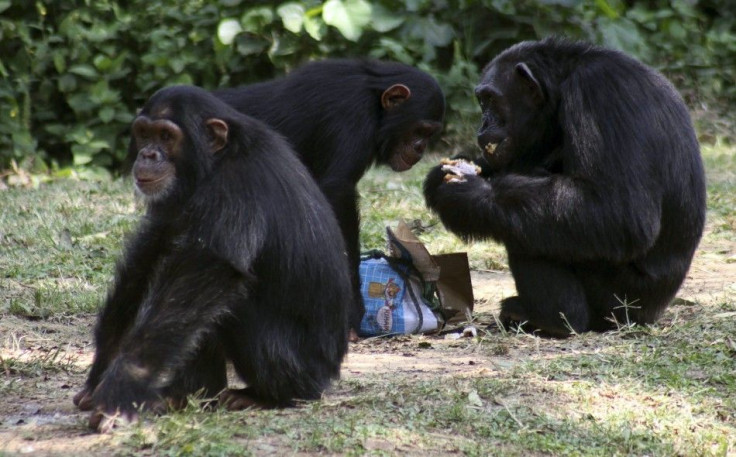Chimpanzees Are Altruistic Animals, Study Finds

Chimpanzees have been found to be genuinely altruistic animals that care about the welfare of others -- denying previous claims characterizing them as self-regarding, according to a new study.
While humans have widely been known to demonstrate altruistic manners and generosity toward others, chimpanzees (Pan troglodytes) were previously known as "reluctant altruists," only sharing and looking out for others when pressured.
Studies conducted in the past confirming the selfish nature of chimpanzees contradicted field studies, since chimps are frequently observed in nature unselfishly sharing with others similar to humans.
"For the past decade we have lived through the curious situation -- frustrating for many chimpanzee fieldworkers and observers -- that chimps are well known for spontaneous acts of altruism, yet have not shown the same tendencies in well-controlled experiments," said lead author Frans de Waal, a primatologist at Emory University.
Researchers at Emory University in Atlanta decided to construct a simplified experiment to prove chimpanzees indeed have a prosocial nature.
The team designed a Prosocial Choice Test using seven female chimps matched with three different partners, which yielded ample evidence that chimpanzees are sensitive for the needs of others while benefiting themselves.
Chimpanzees were placed in neighboring cages with a bucket of 30 tokens, split between two different colors. The subjects were trained to understand that tokens can be exchanged for food and knew what each color represented. One color meant receiving banana slices to share with a bystanding chimp and another color token signified food only for the female chimp.
Nearly 70 percent of the time, the female chimp chose the option which granted food for herself and food to share with the onlooking chimp. The prosocial behavior happened in situations both voluntarily and when pressured by the watching chimp, who elicited the female chimp due to the sound of the packaged banana slices. In fact, findings showed that the drive to share with the bystander was reduced in pressuring situations.
The results of this simplified version of the test, published in Proceedings of the National Academy of Sciences, proved the inherent nature of chimpanzees to be altruistic, previously suspected by scientists. Previous tests led scientists to believe otherwise, but it was the complexity of the tests that deterred chimpanzees from acting the way they normally do in nature.
"Most earlier studies had presented the apes with a complex apparatus that helped them deliver food to themselves or others, often so complicated that the experiments tested tool skills rather than social tendencies," de Waal said in a statement to LiveScience. "Ours is the first study that uses no such apparatus at all."
The findings show that altruism is not unique for humans but rather a characteristic evolving from mammals millions of years ago.
"Since empathy is an old mammalian trait, there is no reason why the sort of altruism we describe should be unique for the primates," Frans de Waal told Discovery News. "I expect it will be found in dogs [and] rats," he added. "We, and others, found it previously in monkeys: capuchin monkeys, marmosets, tamarins."
© Copyright IBTimes 2025. All rights reserved.






















